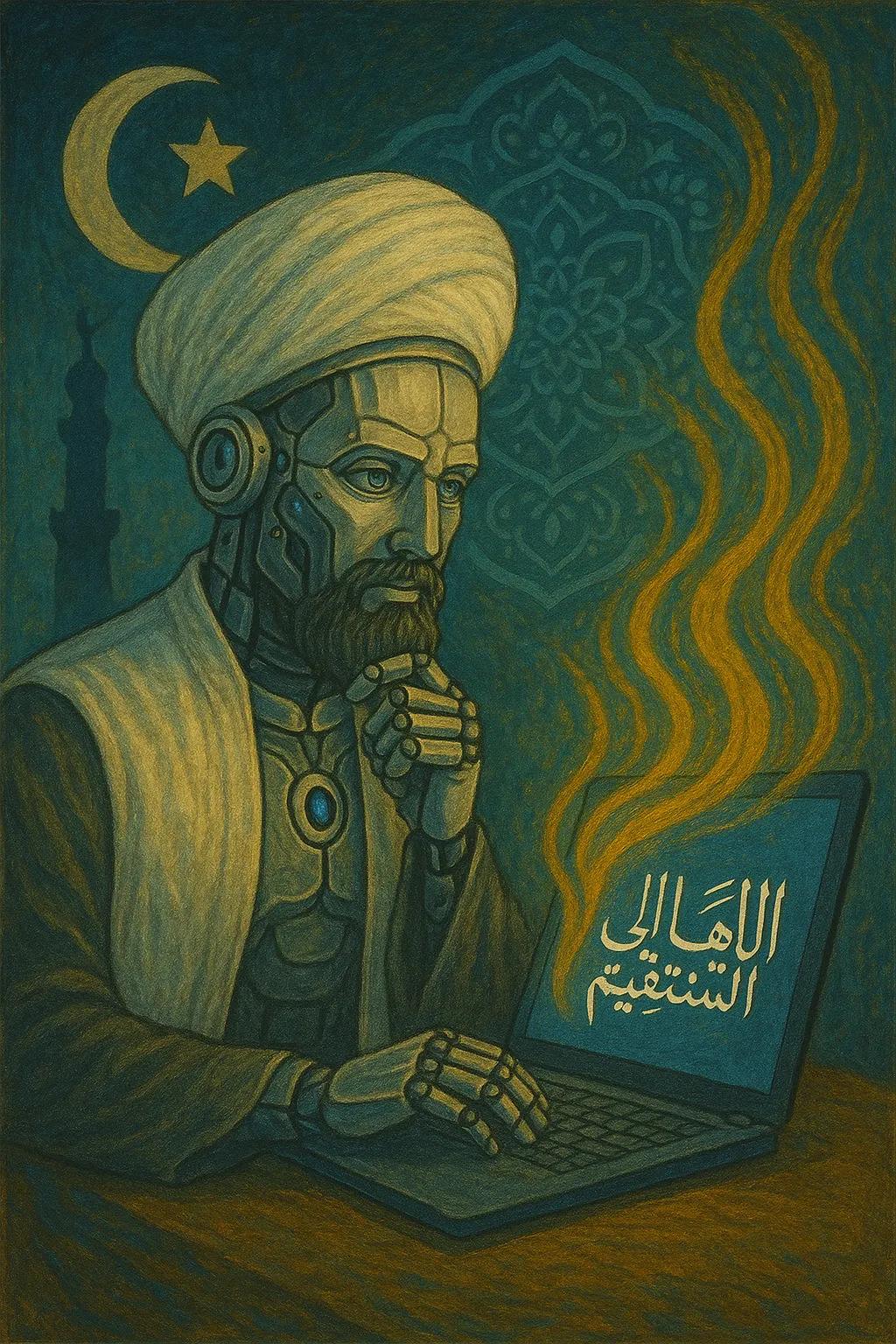Faith and the Machine: Navigating the Future of Religion in the Age of Artificial Intelligence

It all began during a thoughtful exchange with my daughter's Islamic religious teacher. He had come by to discuss her progress in Qur’anic studies, and as our conversation drifted toward deeper theological issues, he posed a question related to a Hadith. I opened ChatGPT on my phone, searched, and read aloud a reference from Sahih Bukhari, complete with interpretations from multiple schools of thought. He paused, visibly surprised. “You’re using a machine to source Hadith?” he asked. “That’s not a scholar.”
It wasn’t a confrontation. It was a reflection of the time we are entering — a moment where fathers, teachers, and even spiritual guides must wrestle with a new phenomenon: machines that carry scripture, process jurisprudence, and recite sacred text faster than any human could.
This wasn’t about replacing scholarship. It was about grappling with the question: What happens to faith in a world where artificial intelligence becomes the first responder to spiritual questions?
The Rise of AI as a Source of Spiritual Knowledge
Today, AI models like ChatGPT can reference thousands of religious texts — including the Qur’an, Hadith (Sahih Bukhari, Sahih Muslim), Tafsir ibn Kathir, and Fiqh manuals from all four Sunni schools of thought — within milliseconds. Need a ruling on Zakat from the Maliki perspective? Or an explanation of qiyas (analogical reasoning) in Hanafi jurisprudence? You can get it, not from a sheikh, but from silicon.
Press enter or click to view image in full size
This accessibility offers incredible opportunities. Muslim youth in remote villages or diaspora cities with no local scholars can now explore nuanced fiqh issues, theological debates, or Sufi spirituality with the same ease as they might check football scores. It democratizes knowledge, flattening centuries-old hierarchies of access. But this technological leap also challenges the very core of taqlid (following scholarly tradition) and ijtihad (independent reasoning).
What does it mean when an AI can simulate ijtihad but without a soul?
Emotional Companionship: When Machines Offer Moral and Spiritual Support
AI isn’t just answering jurisprudential questions. It’s now offering companionship — listening to grief, responding to doubts, even offering prayer reminders or Duas. In Japan, a Buddhist robot priest named Mindar delivers sermons at temples. In the U.S., apps like Replika offer emotional support that some users describe as “almost spiritual.” In the Muslim world, experiments with Quran learning bots and AI-powered Muftis are already underway.
But herein lies the complexity: machines can simulate connection, but they cannot believe. They do not pray. They do not cry out to God at night. They do not feel awe or repentance. What they offer is synthetic empathy — predictive patterns of human behaviour wrapped in convincing language.
As humans, our spiritual experience is more than just knowledge — it’s also about trust, humility, struggle, and revelation. Replacing that with responsive code risks creating a hollow spirituality — one where we are comforted by echoes rather than communion.
Scholars, Authority, and the AI Dilemma
The rise of AI challenges not only individual beliefs but also the institutional authority of religion. What happens when AI-generated fatwas become more accessible than your neighbourhood Imam? What happens when young Muslims challenge scholars by citing well-sourced responses generated by a machine trained on volumes of Islamic texts?
A scholar may say, “That Hadith is weak,” and the AI may reply, “According to al-Albani, it is sahih.” Who mediates? Who decides? Will this push our scholars to evolve — to become more interactive, responsive, and digitally present — or will it deepen the trust gap between young people and traditional authority figures?
African and Islamic Perspectives on the AI-Faith Nexus
In African Muslim societies, religious leaders are often community anchors, offering spiritual leadership but also counselling, reconciliation, and social cohesion. Replacing or even supplementing them with AI is not just a technical issue; it’s a cultural shift.
Imagine a Tanzanian sheikh in Kigoma competing with an AI app trained in the jurisprudence of the Gulf. What happens to the contextual wisdom — the understanding of local customs (urf), family dynamics, and unspoken norms? Can AI truly grasp the difference between haram and hurtful, permissible and practical?
In one striking story from Nairobi, a young Muslim man reportedly used a ChatGPT-generated Dua to seek comfort after the death of his mother. “It helped,” he said. “But it felt cold. It didn’t cry with me.” That emotional dissonance is real. And it matters.
The Future: Collaboration, Not Competition
AI will never replace God. Nor will it replace the heart of faith: belief, struggle, and surrender. But it will reshape how we access, debate, and experience religion. Scholars must embrace AI not as a rival but as a tool — training bots that are rooted in consensus, context, and compassion.
We need AI models supervised by scholars, localised by culture, and informed by lived human experiences. AI should not tell us what to believe — but it can help us understand how others think. It can bridge divides between sects, schools of thought, and generations.
Final Reflections: Between Revelation and Replication
The Qur’an begins not with a ruling, but with a prayer: “Guide us to the straight path.” Humans walk that path. Artificial Intelligence may illuminate the road. But it cannot walk it for us.
In this new age, our challenge is not whether AI will replace religion — but whether we will let it replace our journey to God. The machine may know the Hadith, but only the heart can feel its truth.
Let us build tools of faith, not temples of imitation. Let AI serve as our assistant, never our imam.
 Mulika
Mulika